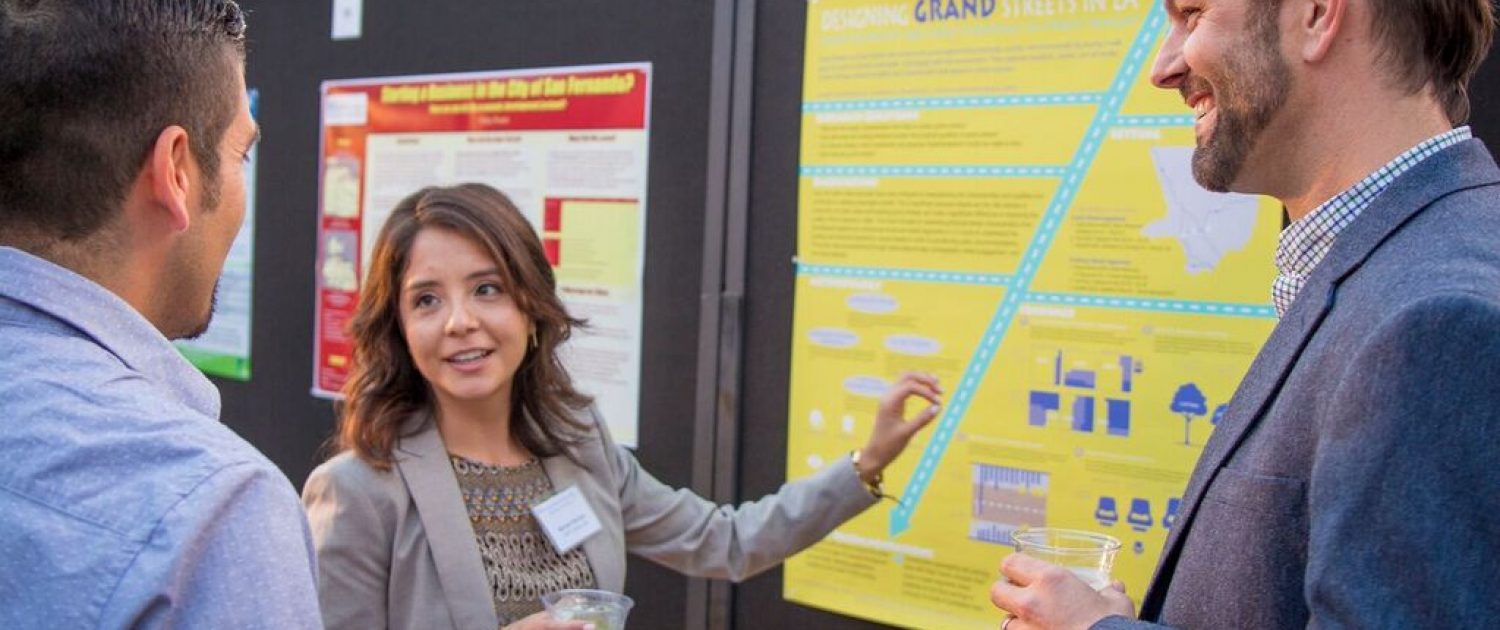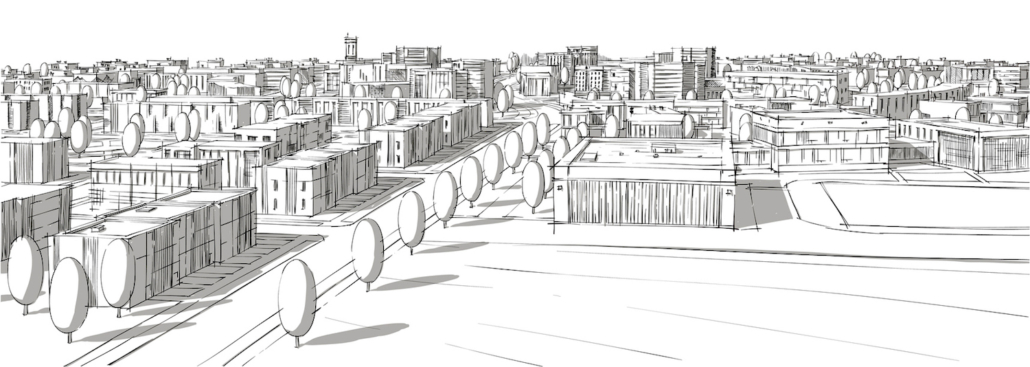Client Projects
The Client Project is applied planning research on a real-world problem conducted by MURP students in their 2nd year in order to satisfy the capstone requirement for the degree. Students present visual representations of their research at Careers, Capstones, and Conversation: A Networking Event (CCC) in the Spring. Each year at CCC three students are awarded for outstanding posters. The 2017 poster winners are below.
All capstone projects can be viewed in the CAPSTONE PROJECT DATABASE!
Community Collaborative & Comprehensive Projects
Community Collaborative & the Comprehensive Projects are similar, in many respects, to the client project, but larger in scope and scale. These projects simulate real world planning practice in that they incorporate students from various areas of concentration working together to research a problem from multiple planning angles.
The Community Collaborative, launched in 2020, grew out of the Community Scholars Program, which was created in 1991 as a joint initiative of UCLA’s Department of Urban Planning and the Center for Labor Research and Education in recognition of the important role that grassroots community and labor leaders, organizers, and artists play in shaping community development policy in Los Angeles. The Community Collaborative program continues to work in this spirit and provides an opportunity for these key grassroots players, regardless of their formal education background, to participate in this special applied research seminar along with graduate students. All work together on research and strategy-building on an issue of pressing concern to Los Angeles communities.
The 2017 Community Scholars and Comprehensive Project reports are below. All capstone projects can be viewed in the CAPSTONE PROJECT DATABASE!
Master’s Theses
The thesis focuses on posing and answering a research question in planning that has not previously been answered. Research is conducted by a MURP student in conjunction with a faculty committee. Students present visual representations of their research at Careers, Capstones, and Conversation: A Networking Event (CCC) in the Spring. The 2017 theses posters are below. All capstone projects can be viewed in the CAPSTONE PROJECT DATABASE!
Doctoral Dissertations
After successful completion of all requirements in planning theory and history, the major field, research methods, and outside coursework, students petition for appointment of a doctoral committee. The doctoral committee guides the student in preparing the dissertation, which is to be a monograph representing an original contribution to planning knowledge. The class of 2017 is listed below. To view all doctoral dissertations visit the UCLA Library.
Dr. Lisa Katarina Berglund
Professor Anastasia Loukaitou-Sideris
Experts of Crisis: Exclusion from Professional Urban Planning Discourse and Community Resistance in the Redevelopment of Detroit
Dr. Emily Erickson
Professor Abel Valenzuela, Jr.
Citizens of Heaven: Fear, Faith, and Political Participation of Undocumented Americans
Dr. Stephen Craig Gibson
Professor Anastasia Loukaitou-Sideris
“Can I Come To The Park?” Access to Urban Open Space: An investigation of older adults in Australia, their perceived and real access to open space, and implications for practice.
Dr. George Lee Mackey III
Professor Susanna B. Hecht
Mobilizing the Matrix of Tropical Agro-Innovation: Multi-Locational Agents and Inter-Regional Learning in South American Agro-Industrial Systems
Dr. Joseph Perman
Professor Leobardo Estrada
The Reconstruction of Post-Tsunami Banda Aceh, Indonesia: A spatial analysis of the rebuilding of structures, roads, and productive land
Dr. Imge Akcakaya Waite
Professor Anastasia Loukaitou-Sideris
Planning, Power, Politics: Urban Redevelopment in Istanbul
Critical Planning Journal
Critical Planning is the graduate-student-run journal of the UCLA Urban Planning Department. CPJ began in 1993 as a forum for the urban studies and planning communities to debate current issues, showcase emerging research, and propose new ideas concerning cities and regions. The core mission of Critical Planning is to promote criticality and social justice. In pursuit of these ends, Critical Planning seeks out new forms of knowledge and modes of representation. The journal is thus not only a space for planning scholars and practitioners, but also activists, artists, organizers and others who take “the city,” however defined, as their object of inquiry. Past volumes can be viewed on CPJs eScholarship page.
CRITICAL PLANNING, VOLUME 26: Call for Submissions by Dec. 31, 2021
CALL FOR SUBMISSIONS
Critical Planning, Volume 26: Just Futures
Deadline for submissions: Dec. 31, 2021
Anticipated publication date: Fall of 2022.
Abolitionists, activists, and artists have long conjured just futures, or visions that serve as alternatives to the unjust social and material conditions of the world. Social movements are galvanized by such visions, which are templates for toppling the carceral, patriarchal, fascist, and other imperial manifestations of power.
Urban planning is always implicated in questions of the future. Indeed, planning has been a preferred tool of the state for realizing its own unjust futures. Planning as extraction, as segregation, as eviction and forced removal, as genocide. These are the outcomes of futuristic visions rooted in what Sonya Renee Taylor has called “white supremacist delusion”1 and is the legacy that planning must contend with as it simultaneously confronts the ongoing crises of climate change, racial and social injustice, and a global pandemic.
What does planning for just futures look like? Or, put another way, can planning be saved? What are the extant practices of, emerging relationalities within, or alternatives to planning that provide a glimpse of the just world we want to live in, and how to get there? Such questions ask us to think both within the field of planning and beyond it, to undo planning and recreate it. To think about planning for just futures is to think about reimagining planning itself.
In this call for submissions we invite pieces that elucidate and elevate practices of and towards just futures. We are interested in submissions that interrogate the boundaries or limits of planning, whether as a profession, as a field of scholarship, or as an insurgent practice for realizing more just futures. To that end we encourage submissions from multiple disciplines and practices including but not limited to urban planning, history, art, architecture, ethnic studies, gender studies, geography, sociology, or anthropology. We welcome both traditional academic formats as well as multimedia, multisensory submissions.
Possible lines of exploration include:
- Alternative planning practices and alternatives to planning
- Racial justice and social equity
- Indigenous sovereignty
- Feminist and queer futures
- Collective grief and healing
- Solidarity economies
- Practices of hope
- Climate change
- Community resilience
- Intersectionality
- Belonging and community ownership
- Unlearning
- Multispecies justice and more-than-human futures
- Reimagining public health
- Alternative methodologies and ways of knowing
- Abolition
Instructions for authors
Critical Planning Journal (CPJ) is a double-blind peer-reviewed publication. Submissions should be original (not published elsewhere). CPJ accepts various submission formats including, but not limited to, academic articles, fiction, poetry, manifestos, and personal essays. We also welcome multi-media submissions, including photographs, maps, art, or design projects related to the call above. We encourage submissions that incorporate cross-disciplinary, multi-scalar, multi-sited, transnational, or mixed-method approaches. If you wish to submit a photograph to be considered for the volume’s cover, please indicate so in your submission.
Submissions should include a cover sheet and an anonymized manuscript. Your cover sheet should include the title of your piece, your full name, institutional affiliation (if any), phone number, email address and a two-sentence biographical statement. Academic articles should generally be between 5,000 and 7,000 words. Submissions should not exceed 7,000 words including notes, bibliographic references, and in-text citations. All academic submissions should be written according to the standards of the Chicago Manual of Style, 17th Edition (author-date style). Cite references in the text by name and year in parentheses. Please refer to the Chicago Manual of Style Online Citation Guide. We highly recommend using a citation management program (e.g. Zotero, Endnote, Mendeley) to maintain consistency. Please double-space all parts of the manuscript and leave one-inch margins on all sides. Images should be provided in .TIF format, not to exceed a width of 5 inches and a resolution of 600 dpi (a width of 3000 pixels).
The Editorial Collective behind CPJ Volume 26 is managing a multilingual review process. We will accept submissions in any language, pending the availability of fluent reviewers. If you are hoping to make a submission in any non-English language, we ask that you contact the editors in advance regarding our capacity to review in that language.
Submissions are due by December 31, 2021. To submit, please visit https://escholarship.org/uc/uclaspa_criticalplanning and follow the link and instructions on the right side of the screen (you will be asked to create an account). We expect to publish CPJ Volume 26 in Fall of 2022.
For more information, please email Emma French at emmafrench@ucla.edu or Gus Wendel at gwendel1583@ucla.edu.
1 Sonya Renee Taylor’s Instagram page, accessed September 25, 2021
Awards, Competitions & Independent Studies
Every year MURP and PhD students participate in/apply for various awards and competitions as well as create their own educational trips and independent studies. These extracurricular activities take learning beyond the classroom and allow students to share their work to with a larger community. These opportunities are invaluable to the learning process and professional development of our students. If you are interesting in supporting these educational opportunities click here for more details.


